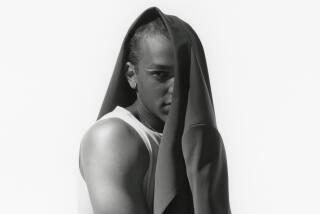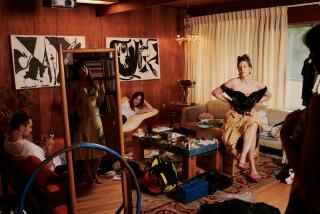Helen B. Cohn, 92; Helped Put Cowboys in Rhinestones
Helen Barbara Cohn, a.k.a. Bobbie Nudie, whose business savvy helped her husband create the legendary Nudie suit and become king of the western costumers, died Friday at a hospital in Valencia, according to her granddaughter Jamie. Cohn was 92.
“She was the backbone to my grandfather and wrote up all the orders,” Jamie Nudie told The Times on Saturday. “She greeted everyone as they came through the door and made sure everyone had a nice cup of coffee.”
Starting in the late 1940s, Nudie suits became high fashion for western swing bands and movie cowboys. Created by her husband, the flamboyant Nudie Cohn, the suits were marked by their vibrant colors and decorative rhinestones and embroidery.
But Nudie, as he was known, did not confine himself just to suits. Boots, saddles and belts -- anything with leather tooling -- became part of the line, as well as pantsuits and dresses for women.
And then there were the cars, mainly convertibles with steer horns on the front grille and rifles, six-shooters and derringers as part of the ornamentation. Nudie designed 18 of them. Many were sold off and fell into disrepair. Some are in museums around the country. One is on loan at the Petersen Automotive Museum in Los Angeles.
Nudie fashions became so popular among country music stars -- most prominently Hank Snow and Porter Wagoner -- that many of their owners were hard-pressed to give them up. The legendary Hank Williams Sr. was buried in a Nudie suit. And more recently, California country pioneer Buck Owens was buried in one of his Nudies. Roy Rogers was another who wore his Nudie suit to the grave.
Perhaps the most famous Nudie creation of all was worn not by a country singer but by rock ‘n’ roll royalty, the King, Elvis Presley. That suit, created in the 1950s, was made of gold lame and priced at $10,000. Nudie later said his profit on the creation was $9,500.
The Nudie look crossed over into rock music in a more substantial way in 1968 when the country-rock band the Flying Burrito Brothers -- which included the influential Gram Parsons -- started wearing them. Parsons’ suit, decorated with marijuana leaves, became an iconic image in rock. Other rockers, including Elton John and Keith Richards, soon followed.
And while his stock in trade was outrageous fashion, Nudie also created the simple but elegant “man in black” look for Johnny Cash.
Today, Nudie creations continue to be popular with collectors.
“Bobbie Nudie” was the nickname Cohn’s husband gave her. She was born Helen Kruger in Mankato, Minn., on July 29, 1913.
Her parents ran a boarding house, and she met her future husband when he rented a room.
They fell in love and traveled to New York City, where he tried to make a living making costumes and accessories for burlesque queens and Broadway showgirls. But the business fared poorly and the couple moved back to Mankato, where they married and ran a dry cleaning store.
But according to their granddaughter Jamie, Nudie became restless and the couple moved with their daughter to Los Angeles in 1939, so he could try his tailoring luck with the Hollywood set. After making sportswear for a few years, Nudie was eager to produce flashier attire, but for whom?
Cohn and Nudie loved western swing music, and Nudie decided that western bands weren’t appropriately attired. So he approached singer Tex Williams and asked to outfit his band with Nudie suits. Williams auctioned off a horse to give Nudie the money he needed to get into business. In return, he and the members of his band got suits.
The family store was originally the garage of their North Hollywood home, the main cutting table formerly used for Ping-Pong. From that beginning, the couple became a show business fashion phenomenon.
They opened their store, Nudie’s Rodeo Tailors Inc., at Victory Boulevard and Vineland Avenue in North Hollywood in 1947 and moved to a larger location near Lankershim and Magnolia boulevards in 1963.
Nudie died in 1984 at 81 and was buried in one of his suits. Cohn continued to run the store, working from her husband’s patterns that they had saved over the years. She worked with her daughter, Barbara, until her death from cancer in 1990 and with her granddaughter Jamie. The store closed in 1994, but Jamie still does custom orders.
The Palomino, a big plastic horse that stood in front of the store for years, is now in the Country Music Hall of Fame in Nashville, along with one of Nudie’s original sewing machines and the sign from the store.
In addition to Jamie, Cohn is survived by another granddaughter, Morelia Cuevas; three great-grandchildren; and her sister Edith Macho.
Funeral arrangements are pending.






